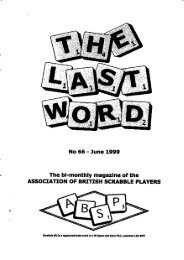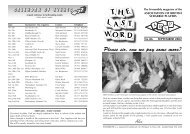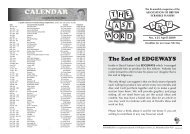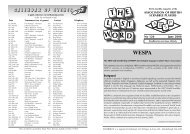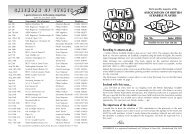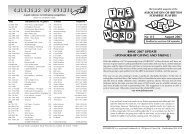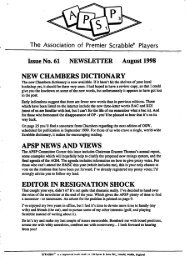TLW 111 - Nomads Results
TLW 111 - Nomads Results
TLW 111 - Nomads Results
Create successful ePaper yourself
Turn your PDF publications into a flip-book with our unique Google optimized e-Paper software.
Author! Author!<br />
Marvellous descriptive powers, impenetrable plots, grotesque<br />
yet sometimes oddly touching characters - reading Dickens is<br />
like being borne along on a very energetic river, sometimes<br />
wishing you had a bit more control over where it was taking<br />
you. Here are some perhaps less familiar words that you will<br />
meet in his work.<br />
bagwig a black hair wig carried in a small silk bag.<br />
barouche a four-wheeled hooded carriage.<br />
beadle a minor parish official whose duties include preserving<br />
order at services and sometimes civil functions. Some<br />
parishes hired them to run the workhouse after the 1834<br />
New Poor Law was passed, as was the case with Bumble,<br />
the beadle in Oliver Twist.<br />
Charles Dickens<br />
biffin a kind of apple, often baked and flattened into a cake.<br />
blucher a strong leather half-boot, named after Gebhard Leberecht von Blucher (1742-<br />
1819), the Prussian field-marshal at Waterloo.<br />
bootjack a device used to remove boots.<br />
brazier a large flat pan filled with coals, used as a heater.<br />
bridewell a house of correction, a jail (contraction of St. Bridget's Well in London, site of<br />
a prison until 1869).<br />
burgess a town magistrate or government official.<br />
caul a membrane that surrounds a foetus, believed to protect against drowning. David<br />
Copperfield was born with a caul, which was then advertised for sale.<br />
chandler originally a maker or seller of candles, later a small grocer.<br />
chouse to cheat.<br />
cotillion, cotillon a lively ballroom dance.<br />
dreadnought, dreadnaught a closely-woven thick woollen material (now more often used<br />
to mean a battleship).<br />
ecod a mild oath on par with, and probably derived from, 'My God'. This was a favourite<br />
expression of Jonas Chuzzlewit in Martin Chuzzlewit.<br />
equipage equipment used in relation to horse and carriage.<br />
fagin an adult who instructs others in crime, from the character of that name in Oliver<br />
Twist.<br />
gammon a misleading or deceptive comment; (verb) to perpetrate a hoax on.<br />
gingham a clothing fabric usually of yarn-dyed cotton.<br />
hogshead a large cask or barrel, equal to 521/2 imperial gallons.<br />
hostler, ostler one who tends horses at an inn. Hugh is hostler at the<br />
Maypole in Barnaby Rudge.<br />
laudanum a mixture of opium and alcohol used as a tranquilizer,<br />
pain-killer, or to induce sleep.<br />
lucifer a match made of a sliver of wood tipped with a combustible substance,<br />
and ignited by friction. First manufactured in the 1830's.<br />
lummy excellent: LUMMIER, LUMMIEST.<br />
nankeen, nankin a pale yellowish cotton cloth, also trousers made<br />
from this cloth. [From Nanking in China].<br />
negus a liquor made from wine, water, sugar, nutmeg, and lemon-juice.<br />
oakum loosely twisted hemp fibres, impregnated with tar, used in rope. Picking oakum<br />
apart was a common task in prisons and workhouses: the separated oakum was then<br />
used to caulk ships. Oliver picked oakum at the workhouse in Oliver Twist.<br />
30<br />
patten a device attached to the bottom of lady's shoes to keep them out of the mud in the<br />
streets, sometimes consisting of circular metal rings which caused a distinctive sound<br />
on the pavement.<br />
peacoat a short double-breasted navy blue or black overcoat worn by seamen.<br />
phaeton an open four-wheeled carriage.<br />
pompey to pamper.<br />
postern a back entrance.<br />
postilion, postillion one who guides a horse-driven coach by riding on the left-hand lead<br />
horse.<br />
potboy an employee at a tavern who served beer to customers.<br />
quadrille a card game played by four people.<br />
recusant one who refused to attend Church of England services.<br />
scrivener a professional scribe or copier.<br />
surtout a double-breasted, full-skirted, close-bodied suit.<br />
tumbrel, tumbrel an open cart which tilted backwards to empty its load. Used to carry prisoners<br />
to the guillotine during the French Revolution, as in A Tale of Two Cities.<br />
turnkey a jailor. John Chivery was turnkey at the Marshalsea prison in Little Dorrit.<br />
turnpike a toll road.<br />
vintner a wine merchant.<br />
waterman one who operated boats on the Thames carrying passengers for a fee.<br />
worrit to worry, annoy.<br />
Blank Racks<br />
Add a blank to each of the following eight racks to make a total of twenty-six eight-letter<br />
words, with the blank being a different letter in each case. An intermediate solution<br />
is available on page 35 showing the values the blank must take in each case but not giving<br />
the actual anagrams.<br />
AADIKNR ABEENRT AAEJRSS CEOOPSW<br />
AAENRTU EIKNSTU AAGHKMN EIMOPRU<br />
Curio Corner<br />
Normally, adverbs ending in -LY do not have comparative or superlative forms e.g. one<br />
says “more glibly”, not GLIBLIER*. Some of those words that appear to be exceptions<br />
prove on investigation to be the comparative forms of adjectives that happen to have<br />
the same form as the adverb e.g. HOOLY/HOOLIER, KINDLY/KINDLIER, UNKIND-<br />
LY/UNKINDLIER, WEAKLY/WEAKLIER. But there are just a very few genuine adverbs<br />
that cannot be used as adjectives and yet still compare:<br />
BRAWLY BRAWLIER BRAWLIEST<br />
FEATLY FEATLIER FEATLIEST<br />
FITLY FITLIER FITLIEST<br />
LOUDLY LOUDLIER LOUDLIEST<br />
WISELY WISELIER WISELIEST<br />
Why these five should have been singled out for special treatment I don’t know.<br />
31



